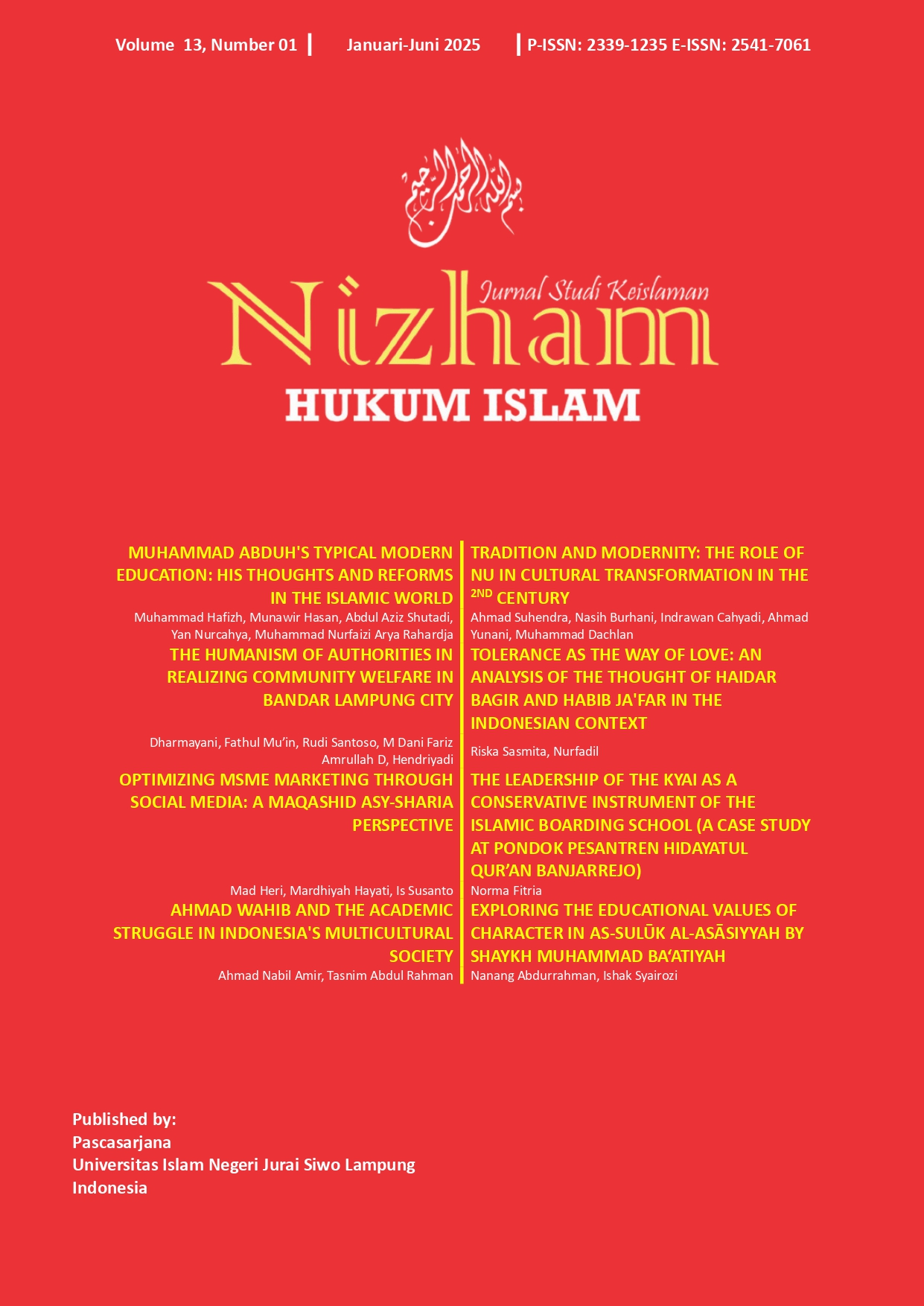Suppressing Divorce with Stoicism
DOI:
https://doi.org/10.32332/nizham.v13i02.11385Keywords:
Stoicism, divorce, marriage, self-control, pre-marital educationAbstract
The persistently high divorce rate in Indonesia indicates a lack of effective psychological frameworks for sustaining marital stability. Despite numerous interventions, few have integrated philosophical approaches to strengthen emotional resilience in marriage. This study aims to address this gap by exploring the application of Stoic principles as a means of reducing divorce rates through the enhancement of couples’ psychological and emotional endurance. Employing a qualitative design, while qualitative insights were obtained via in-depth interviews and case studies. The findings reveal that Stoic value significantly contribute to constructive conflict management, effective communication, and greater tolerance of differences. Moreover, statistical analysis shows a positive correlation between the application of Stoic principles and marital satisfaction, accompanied by a reduction in divorce intentions. The study concludes by recommending the integration of Stoic-based emotional training into premarital education and marriage counseling programs to promote emotionally resilient and harmonious families in the complexities of modern life.
Downloads
References
Adristi, Salsabila Priska. “Peran Orang Tua Pada Anak Dari Latar Belakang Keluarga Broken Home.” Lifelong Education Journal 1, no. 2 (2023): 131–38. https://doi.org/10.59935/lej.v1i2.30.
Agraida, Aisya. “Analisis Yuridis Penyelesaian Harta Gono Gini Melalui Proses Mediasi.” Indonesia Journal of Business Law 1, no. 2 (2022): 58–68. https://doi.org/10.47709/ijbl.v1i2.1874.
Angelica, Febi Ayu Milka, and Karel Karsten Himawan. “Tahan Atau Pikir Kembali: Strategi Regulasi Emosi Dan Kepuasan Pernikahan Pada Masa Pandemi Covid-19.” Persona Jurnal Psikologi Indonesia 11, no. 1 (2022): 107–22. https://doi.org/10.30996/persona.v11i1.6294.
Anggraini, Citra, Denny Hermawan Ritonga, Lina Kristina, Muhammad Syam, and Winda Kustiawan. “Komunikasi Interpersonal.” Jurnal Multidisiplin Dehasen (MUDE) 1, no. 3 (2022). https://doi.org/10.37676/mude.v1i3.2611.
Angin, Yakub Hendrawan Perangin, and Tri Astuti Yeniretnowati. “Implentasi Pengendalian Konflik Keluarga Bagi Relasi Suami Istri Kristen.” Jurnal Pendidikan Agama Kristen (JUPAK) 2, no. 1 (2021): 127–42. https://doi.org/10.52489/jupak.v2i1.18.
Arslan, G, M Yıldırım, and P Wong. “Meaningful Living, Resilience, Affective Balance, and Psychological Health Problems during COVID-19. 2020.” DOI: Https://Doi. Org/10.31234/Osf. Io/Wsr3e, n.d.
Aziz, Ahmad Zaed Abdul. “The Application of Stoic Philosophy to Modern Emotional Regulation,” 2025, 4265–80. https://doi.org/10.38124/ijisrt/25apr2400.
Chaliddin, Chaliddin. “Peran Pendampingan Bantuan Hukum Keluarga Pada Kasus Kekerasan Dalam Rumah Tangga (KDRT) Di Gampong Hagu Barat Laut Kecamatan Banda Sakti Kota Lhokseumawe.” Syarah Jurnal Hukum Islam & Ekonomi 10, no. 2 (2021): 151–72. https://doi.org/10.47766/syarah.v10i2.212.
Djawas, Mursyid, and Sri Astuti A Samad. “Conflict, Traditional, and Family Resistance: The Pattern of Dispute Resolution in Acehnese Community According to Islamic Law.” SAMARAH Jurnal Hukum Keluarga Dan Hukum Islam 4, no. 1 (2020): 65. https://doi.org/10.22373/sjhk.v4i1.5271.
Gross, James J., and Oliver P. John. “Individual Differences in Two Emotion Regulation Processes: Implications for Affect, Relationships, and Well-Being.” Journal of Personality and Social Psychology 85, no. 2 (2003): 348–62. https://doi.org/10.1037/0022-3514.85.2.348.
Johnson, Elle P, and Jennifer A Samp. “Stoicism and Verbal Aggression in Serial Arguments: The Roles of Perceived Power, Perceived Resolvability, and Frequency of Arguments.” Journal of Interpersonal Violence 37 (2021). https://doi.org/10.1177/0886260521994583.
Khafidhoh, Inayatul. “Pemberdayaan Keluarga Dalam Peningkatan Ketahanan Keluarga Melalui Structural Family Counseling.” Community Development 5, no. 1 (2021): 21. https://doi.org/10.21043/cdjpmi.v5i1.9554.
Kirana, Dea Ayu. “Konsep Kebahagiaan Hidup Menurut Marcus Aurelius Ditinjau Dari Perspektif Filsafat Stoikisme.” In Gunung Djati Conference Series, 24:257–68, 2023.
Muchtar, M.Ilham, Erfandi AM, Zainal Abidin, Aliman, Ramli, and Dahlan Lama Bawa. “Analisis Prinsip Komunikasi Islami Dalam Membangun Keluarga Harmonis Menurut Alqur’an.” Ulil Albab: Jurnal Ilmiah Multidisiplin 2, no. 10 (2023): 4705–20.
Murdiana, Sitti, and Ismalandari Ismail. “Phubbing Terhadap Kualitas Kelekatan Dewasa Pada Perempuan Menikah Di Kota Makassar.” Jurnal Psikologi TALENTA 7, no. 2 (2022): 62. https://doi.org/10.26858/talenta.v7i2.33286.
Nugroho, Vannesa Almayra, and Nihlatun Niswah. “The Role Of Women In Family Resilience In Jepara District.” Kartini Journal of Gender and Social Inclusion Studies 1, no. 1 (2023). https://doi.org/10.34001/kajogs.v1i1.4876.
Nurhayati, Nurhayati, and Hendrik Fasco Siregar. “Aspek Yuridis Status Hukum Anak Dalam Sengketa Perceraian Dan Pembatalan Perkawinan.” RECHTSREGEL Jurnal Ilmu Hukum 2, no. 1 (2019). https://doi.org/10.32493/rjih.v2i1.2959.
Rahman, Taufik, Lola Pertiwi, and Ariyandi Batubara. “Hakikat Kebahagiaan Hidup: Konsensus Antara Al-Qurâ€TM an Dan Filsafat Stoikisme.” Jurnal Riset Agama 2, no. 3 (2022): 807–21.
Siregar, Dahris, Karolina Sitepu, Mospa Darma, Khairun Na’im, M Tommy Umaro Tarigan, Razali Razali, and Faisal Sadat Soaduon Harahap. “Studi Hukum Tentang Tingkat Perceraian Dan Efeknya Terhadap Anak.” Jurnal Derma Pengabdian Dosen Perguruan Tinggi (Jurnal DEPUTI) 3, no. 2 (2023): 178–85. https://doi.org/10.54123/deputi.v3i2.276.
Sofyan, Basir. “Building a Sakinah Family.” Al-Irsyad Al-Nafs, Jurnal Bimbingan Penyuluhan 7, no. 2 (2019): 1–14.
Syarif, Muhammad. “Dampak Perceraian Terhadap Psikologis, Emosional Dan Mental Anak Dalam Perspektif Hukum Islam.” SYARIAH Journal of Islamic Law 4, no. 2 (2023): 38. https://doi.org/10.22373/sy.v4i2.580.
Downloads
Published
Issue
Section
License
Copyright (c) 2025 Zainal Asikin, Abd. Rahman Hamid, Muhammad Akmansyah, M. Afif Anshori

This work is licensed under a Creative Commons Attribution-ShareAlike 4.0 International License.









